- Home
- Libba Bray
The Diviners
The Diviners Read online
Begin Reading
Table of Contents
Newsletters
Copyright Page
In accordance with the U.S. Copyright Act of 1976, the scanning, uploading, and electronic sharing of any part of this book without the permission of the publisher constitute unlawful piracy and theft of the author’s intellectual property. If you would like to use material from the book (other than for review purposes), prior written permission must be obtained by contacting the publisher at [email protected]. Thank you for your support of the author’s rights.
For my mom, Nancy Bray, who taught me to love reading by example
A LATE-SUMMER EVENING
In a town house at a fashionable address on Manhattan’s Upper East Side, every lamp blazes. There’s a party going on—the last of the summer. Out on the terrace overlooking Manhattan’s incandescent skyline, the orchestra takes a much-needed break. It’s ten thirty. The party has been on since eight o’clock, and already the guests are bored. Fashionable debutantes in pastel chiffon party dresses wilt into leather club chairs like frosted petits fours melting under the July sun. A cocky Princeton sophomore wants his friends to head down to Greenwich Village with him, to a speakeasy he heard about from a friend of a friend.
The hostess, a pretty and spoiled young thing, notes her guests’ restlessness with a sense of alarm. It is her eighteenth birthday, and if she doesn’t do something to raise this party from the dead, it will be the talk for days to come that her gathering was as dull as a church social.
Raising from the dead.
The weekend before, she’d been forced to go antiquing upstate with her mother—an absolutely hideous chore, until they came upon an old Ouija board. Ouija boards are all the rage; psychics have claimed to receive messages and warnings from the other side using Mr. Fuld’s “talking board.” The antiques dealer fed her mother a line about how it had come to him under mysterious circumstances.
“They say it’s still haunted by restless spirits. But perhaps you and your sister could tame it?” he’d said with over-the-top flattery; naturally, her mother lapped it up, which resulted in her paying too much for the thing. Well, she’d make her mother’s mistake pay off for her now.
The hostess races for the hall closet and signals to the maid. “Do be a darling and get that down for me.”
The maid retrieves the board with a shake of her head. “You oughtn’t to be messing with this board, Miss.”
“Don’t be silly. That’s primitive.”
With a zippy twirl worthy of Clara Bow, the hostess bursts into the formal living room holding the Ouija board. “Who wants to commune with the spirits?” She giggles to show that she doesn’t take it seriously in the least. After all, she’s a thoroughly modern girl—a flapper, through and through.
The wilted girls spring up from their club chairs. “What’ve you got there? Is that a wee-gee board?” one of them asks.
“Isn’t it darling? Mother bought it for me. It’s supposed to be haunted,” the hostess says and laughs. “Well, I don’t believe that, naturally.” The hostess places the heart-shaped planchette in the middle of the board. “Let’s conjure up some fun, shall we?”
Everyone gathers ’round. George angles himself into the spot beside her. He’s a Yale man and a junior. Many nights, she’s lain awake in her bedroom, imagining her future with him. “Who wants to start?” she asks, positioning her fingers close to his.
“I will,” a boy in a ridiculous fez announces. She can’t remember his name, but she’s heard he has a habit of inviting girls into his rumble seat for a petting party. He closes his eyes and places his fingers on the scryer. “A question for the ages: Is the lady to my right madly in love with me?”
The girls squeal and the boys laugh as the planchette slowly spells out Y-E-S.
“Liar!” the lady in question scolds the heart-shaped scrying piece with its clear glass oracle.
“Don’t fight it, darling. I could be yours on the cheap,” the boy says.
Now spirits are high; the questions grow bolder. They’re drunk on gin and good times and the silly distraction of the fortune-telling. Every mornin’, every evenin’, ain’t we got fun?
“Say, let’s summon a real spirit,” George challenges.
A knot of excitement and unease twists in the hostess’s gut. The antiques dealer had cautioned against doing just this. He warned that spirits called forth must also be put back to rest by breaking the connection, saying good-bye. But he was out to make a buck with a story, and besides, it’s 1926—who believes in haunts and hobgoblins when there are motorcars and aeroplanes and the Cotton Club and men like Jake Marlowe making America first through industry?
“Don’t tell me you’re scared.” George smirks. He has a cruel mouth. It makes him all the more desirable.
“Scared of what?”
“That we’ll run out of gin!” the boy in the fez jokes, and everyone laughs.
George whispers low in her ear, “I’ll keep you safe.” His hand is on her back.
Oh, surely this is the most glorious night in existence!
“We summon now the spirit of this board to heed our call and tell us our fortunes true!” the hostess says with great intonation broken by giggles. “You must obey, spirit!”
There is a moment’s pause, and then the planchette begins its slow migration across the scarred board’s gothic black alphabet, spelling out a word.
H-E-L-L-O
“That’s the spirit,” someone quips.
“What is your name, o great spirit?” the hostess insists.
The planchette moves quickly.
N-A-U-G-H-T-Y-J-O-H-N
George raises an eyebrow mischievously. “Say, I like the sound of that. What makes you so naughty, old sport?”
Y-O-U-L-L-S-E-E
“See what? What are you up to, o naughty one?”
Stillness.
“I want to dance! Let’s go uptown to the Moonglow,” one of the girls, a pouty drunk, slurs. “When’s the band comin’ back, anyway?”
“In a minute. Don’t have kittens,” the hostess says with a smile and a laugh, but there’s warning in both. “Let’s try another question. Do you have any prophecy for us, Naughty John? Any fortune-telling?” She casts a sly glance at George.
The scryer remains still.
“Do tell us something else, won’t you?”
Finally, there is movement on the board. “I… will… teach… you… fear,” the hostess reads aloud.
“Sounds like the headmaster at Choate,” the boy in the fez teases. “How will you do that, old sport?”
I-S-T-A-N-D-A-T-T-H-E-D-O-O-R-A-N-D-K-N-O-C-K
I-A-M-T-H-E-B-E-A-S-T
T-H-E-D-R-A-G-O-N-O-F-O-L-D
“What does that mean?” the drunken girl whispers. She backs away slightly.
“It doesn’t mean anything. It’s gibberish.” The hostess scolds her guest, but she feels afraid. She turns on the boy with the reputation for trouble. “You’re making it say that!”
“I didn’t. I swear!” he says, crossing his heart with his index finger.
“Why are you here, old sport?” George asks the board.
The planchette moves so quickly they can barely keep up.
I-H-O-L-D-T-H-E-K-E-Y-S-O-F-H-E-L-L-A-N-D-D-E-A-T-H
W-R-A-T-H-I-S-C-O-M-E-A-R-M-A-G-E-D-D-O-N-B-A-B-Y-L-O-N-W-H-O-R-E
“Stop it this instant!” the hostess shouts.
W-H-O-R-E-W-H-O-R-E-W-H-O-R-E the piece repeats. The bright young things remove their fingers, but the piece continues to move.
“Make it stop, make it stop!” one girl screeches, and even the jaded boys pale and move back.
“Stop, spirit! I said stop!” the hostess shouts.
The planchette falls still.
The party guests glance at one another with wild eyes. In the other room, the band members return to their instruments and strike up a hot dance number.
“Oh, hallelujah! Come on, baby. I’ll teach you to dance the Black Bottom.” The drunken girl struggles to her feet and pulls the boy in the fez after her.
“Wait! We have to spell out good-bye on the board! That’s the proper ritual!” the hostess pleads as her guests desert her.
George slips his arm around her waist. “Don’t tell me you’re afraid of Naughty John.”
“Well, I…”
“You know it was the old boy,” he says, his breath tickling her ear sweetly. “He has his tricks. You know how that sort is.”
She does know how that sort is. It was probably that wretched boy all along, playing them for fools. Well, she is nobody’s fool. She is eighteen now. Life will be an endless swirl of parties and dances. Night or daytime, it’s all playtime. Ain’t we got fun? Her earlier fears have been put to bed. Her party looks like it will rage into the night. The carpets have been rolled up, and her guests dance full out. Long strands of pearls bounce against drop-waist dresses. Spats strike defiantly at the wood floors. Arms thrust out, pushing against the air—all of it like some feverish Dadaist painting come to life.
The hostess stashes the board in the cupboard, where it will soon be forgotten, and races toward the parlor with its bright electric lights—Mr. Edison’s modern marvel—and joins the last party of the summer without a care.
Outside, the wind lingers for a moment at those lighted windows; then, with a gusty burst of energy, it takes its leave and scuttles down the sidewalks. It twines itself briefly around the cloche hats of two fashionable young ladies gossiping about the tragic death of Rudolph Valentino as they walk a poodle along the East River. It moves on, down neon-drenched canyons, over the elevated train as it rattles above Second Avenue, shaking the windows of the poor souls trying to sleep before morning comes—morning with its taxi horns, trolley cars, and trains; the bootblacks buffing the wingtips of businessmen in Union Square; the newsies hawking the day’s headlines in Times Square; the telephone operators gazing longingly at the new shawl-collar coats tempting them from store windows; the majestic skyscrapers rising over it all like gleaming steel, brick, and glass gods.
The wind idles briefly before a jazz club, listening to this new music punctuating the night. It thrills to the bleat of horns, the percussive piano strides born of blues and ragtime, the syncopated rhythms that echo the jagged excitement of the city’s skyline.
On the Bowery, in the ornate carcass of a formerly grand vaudeville theater, a dance marathon limps along. The contestants, young girls and their fellas, hold one another up, determined to make their mark, to bite back at the dreams sold to them in newspaper advertisements and on the radio. They have sores on their feet but stars in their eyes. Farther uptown, the Great White Way, named for the blinding incandescence of its theater lights, empties of its patrons. Some stage-door Johnnies wait in the alleys, hoping for a glimpse of the glamorous chorus girls or for a chance at an autograph from one of Broadway’s many stars. It is a time of celebrity, of fame and fortune and grasping, and the young burn with secret ambition.
The wind takes it all in with indifference. It is only the wind. It will not become a radio star or a captain of industry. It will not run for office or fall in love with Douglas Fairbanks or sing the songs of Tin Pan Alley, songs of longing and regret and good times (ain’t we got fun?). And so it travels on, past the slaughterhouses on Fourteenth Street, past the unfortunates selling themselves in darkened alleys. Nearby, Lady Liberty hoists her torch in the harbor, a beacon to all who come to these shores to escape persecution or famine or hopelessness. For this is the land of dreams.
The wind swoops over the tenements on Orchard Street, where some of those starry-eyed dreams have died and yet other dreams are being born into squalor and poverty, an uphill climb. It gives a slap to the laundry stretched on lines between tenements, over dirty, broken streets where, even at this hour, hungry children scour the bins for food. The wind has existed forever. It has seen much in this country of dreams and soap ads, old horrors and bloodshed. It has played mute witness to its burning witches, and has walked along a Trail of Tears; it has seen the slave ships release their human cargo, blinking and afraid, into the ports, their only possession a grief they can never lose. The wind was there when President Lincoln fell to an assassin’s bullet. It smelled of gunpowder at Antietam. It ran with the buffalo and touched tentative fingers to the tall black hats of Puritans. It has carried shouts of love, and it has dried tears to salt tracks on more faces than it can number.
The wind skitters down the Bowery and swoops up the West Side, home of Irish gangs like the Dummy Boys, who ride horseback along Ninth Avenue to warn the bootleggers. It swoops along the mighty Hudson River, past the vibrant nightlife of Harlem with its great thinkers, writers, and musicians, until it comes to rest outside the ruin of an old mansion. Moldering boards cover the broken windows. Rubbish clogs the gutter out front. Once upon a time, the house was home to an unspeakable evil. Now it is a relic of a bygone era, forgotten in the shadow of the city’s growth and prosperity.
The door creaks on its hinges. The wind enters cautiously. It creeps down narrow hallways that twist and turn in dizzying fashion. Diseased rooms, rotted with neglect, branch off left and right. Doors open onto brick walls. A trapdoor gives way to a chute that empties into a vast subterranean chamber of horrors and an even more terrifying room. It stinks still: of blood, urine, evil, and a fear so dark it has become as much a part of the house as the wood and nails and rot.
Something stirs in the deep shadows, something terrible, and the wind, which knows evil well, shrinks from this place. It flees toward the safety of those magnificent tall buildings that promise the blue skies, nothing but blue skies, of the future, of industry and prosperity; the future, which does not believe in the evil of the past. If the wind were a sentinel, it would send up the alarm. It would cry out a warning of terrors to come. But it is only the wind, and it knows well that no one listens to its cries.
Deep in the cellar of the dilapidated house, a furnace comes to life with a death rattle like the last bitter cough of a dying man laughing contemptuously at his fate. A faint glow emanates from that dark, foul-smelling earthen tomb. Yes, something moves again in the shadows. A harbinger of much greater evil to come. Naughty John has come home. And he has work to do.
EVIE O’NEILL, ZENITH, OHIO
Evie O’Neill pressed the sagging ice bag to her throbbing forehead and cursed the hour. It was noon, but it might as well be six in the morning for the pounding in her skull. For the past twenty minutes, her father had been beating his gums at her about last night’s party at the Zenith Hotel. Her drinking had been mentioned several times, along with the unfortunate frolic in the town fountain. And the trouble that came between, of course. It was gonna be a real beast of a day, and how. Her head beat out requirements: Water. Aspirin. Please stop talking.
“Your mother and I do not approve of drinking. Have you not heard of the Eighteenth Amendment?”
“Prohibition? I drink to its health whenever I can.”
“Evangeline Mary O’Neill!” her mother snapped.
“Your mother is secretary of the Zenith Women’s Temperance Society. Did you think about that? Did you think about how it might look if her daughter were found carousing drunk in the streets?”
Evie slid her bruised eyeballs in her mother’s direction. Her mother sat stiff-backed and thin-lipped, her long hair coiled at the nape of her neck. A pair of spectacles—“cheaters,” the flappers called them—sat at the end of her nose. The Fitzgerald women were all petite, blue-eyed, blond, and hopelessly nearsighted.
“Well?” her father thundered. “Do you have something to say?”
“Gee, I hope I won’t need cheaters someday,” Evie muttered.
Evie’s mother responded with a weary sigh. She’d grown smaller and
more worn since James’s death, as if that long-ago telegram from the war office had stolen her soul the moment she had opened it.
“You young people seem to treat everything like a joke, don’t you?” Her father was off and running—responsibility, civic duty, acting your age, thinking beyond tomorrow. She knew the refrain well. What Evie needed was a little hair of the dog, but her parents had confiscated her hip flask. It was a swell flask, too—silver, with the initials of Charles Warren etched into it. Good old Charlie, the dear. She’d promised to be his girl. That lasted a week. Charlie was a darling, but also a thudding bore. His idea of petting was to place a hand stiffly on a girl’s chest like a starched doily on some maiden aunt’s side table while pecking, birdlike, at her mouth. Quelle tragédie.
“Evie, are you listening to me?” Her father’s face was grim.
She managed a smile. “Always, Daddy.”
“Why did you say those terrible things about Harold Brodie?”
For the first time, Evie frowned. “He had it coming.”
“You accused him of… of…” Her father’s face colored as he stammered.
“Of knocking up that poor girl?”
“Evangeline!” Her mother gasped.
“Pardon me. ‘Of taking advantage of her and leaving her in the family way.’ ”
“Why couldn’t you be more like…” Her mother trailed off, but Evie could finish the sentence: Why couldn’t you be more like James?
“You mean, dead?” she shot back.
Her mother’s face crumpled, and in that moment, Evie hated herself a little.
“That’s enough, Evangeline,” her father warned.
Evie bowed her throbbing head. “I’m sorry.”
“I think you should know that unless you offer a public apology, the Brodies have threatened to sue for slander.”
“What? I will not apologize!” She stood so quickly that her head doubled its pounding and she had to sit again. “I told the truth.”
“You were playing a game—”

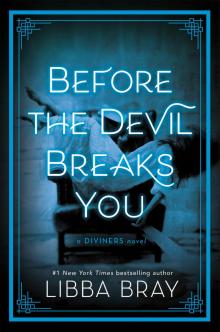 Before the Devil Breaks You
Before the Devil Breaks You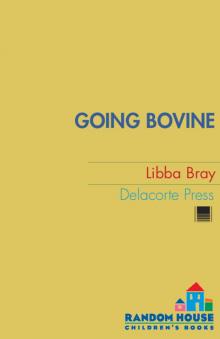 Going Bovine
Going Bovine A Great and Terrible Beauty
A Great and Terrible Beauty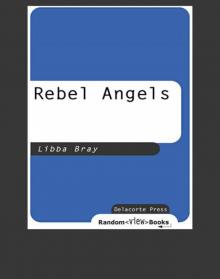 Rebel Angels
Rebel Angels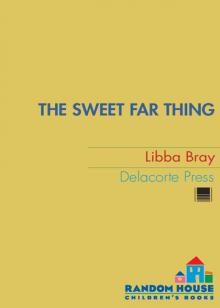 The Sweet Far Thing
The Sweet Far Thing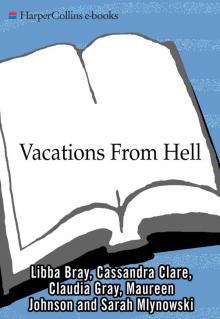 Vacations From Hell
Vacations From Hell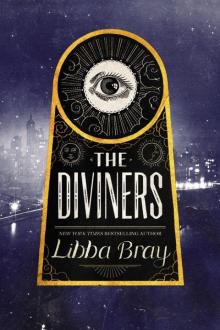 The Diviners
The Diviners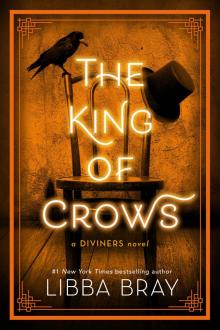 The King of Crows
The King of Crows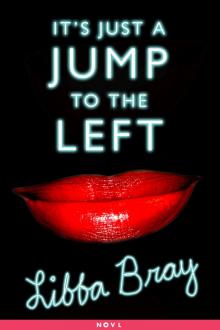 It's Just a Jump to the Left
It's Just a Jump to the Left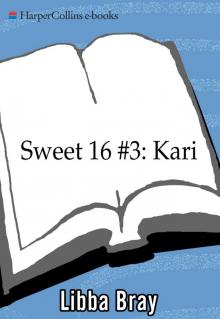 Kari
Kari The Best Science Fiction and Fantasy of the Year Volume 6
The Best Science Fiction and Fantasy of the Year Volume 6